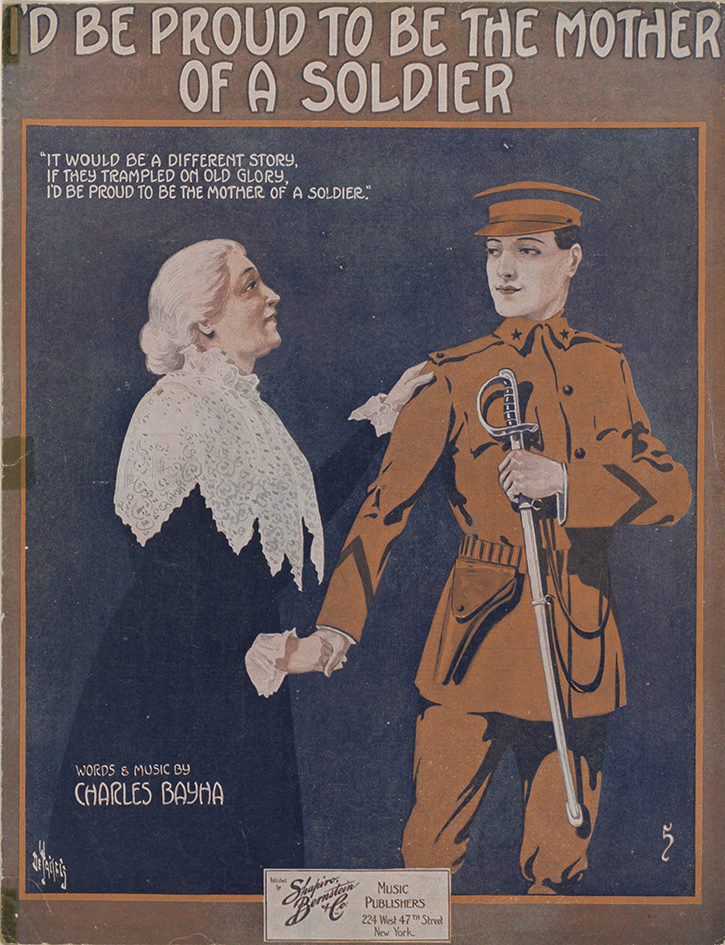I Didn't Raise My Boy to Be a Soldier
Al Piantadosi, Alfred Bryan, 1915 |

 |
Compare this song with "Over There." What feelings does each song suggest parents might have about their sons becoming soldiers? What do you think the "truth" was about parents sending their sons to war? |
 |
What events did these parents possibly experience or hear about that may have explained their feelings here? People were still alive who witnessed the Civil War carnage. |
 |
What did some people give for not becoming involved in World War I? How popular was the idea of becoming involved in an overseas war? What events began to change public opinion? |
 |
After the war, what organization was formed to "let nations arbitrate their future troubles" as it says in the chorus? League of Nations. Why didn't the United States become involved in the League of Nations? What were some of the reasons the League didn't succeed? Has the United Nations done better at avoiding war? Why or why not? |
 |
In what ways do you agree with the last two lines of this song? In what ways do you disagree? |
|

"I Didn't Raise My Boy to Be a Soldier" performed by Morton Harvey on Praise the Lord and Pass the Ammunition, New York: New World Records [NW222], © 1977. Available iTunes, Spotify, and YouTube.
Morton Harvey (1886–1961) was a very popular recording star for a short period of time. He started as a saloon singer in Chicago, was discovered by Bill Murray and made his first recording in 1914. The following year he made the first recording of a blues song with W. C. Handy's "Memphis Blues." Harvey recorded two anti-war songs in 1916: this one and Irving Berlin's "Stay Down Here Where You Belong." "I Didn't Raise My Boy to Be a Soldier" was extremely popular until the United States entered the war in 1917. Then Victor Records stopped selling the record to avoid bad publicity from the public and the government. Unfortunately, being associated with this pacifist song seems to have ended Harvey's recording career. |

View the lyrics for "I Didn't Raise a Boy to Be a Soldier."
View the published score.
|
|
 Al Piantadosi (1884–1955) was a songwriter and contemporary of Irving Berlin. Like Berlin, he also worked in the nightclubs of the less-reputable areas of New York City and wrote his first song in 1906. He published several successful songs before 1920, including some ethnic songs and sentimental ballads. Piantadosi toured extensively in the United States and also traveled to Europe and Australia, where he was a pioneer performer of ragtime. When he returned, he worked for music publishers in New York before retiring in California in 1930. Al Piantadosi (1884–1955) was a songwriter and contemporary of Irving Berlin. Like Berlin, he also worked in the nightclubs of the less-reputable areas of New York City and wrote his first song in 1906. He published several successful songs before 1920, including some ethnic songs and sentimental ballads. Piantadosi toured extensively in the United States and also traveled to Europe and Australia, where he was a pioneer performer of ragtime. When he returned, he worked for music publishers in New York before retiring in California in 1930.
 |
| Cover for the answer song, "I'd Be Proud to Be the Mother of a Soldier." |
This song was introduced in a vaudeville show amidst some controversy as it expressed the reluctance of some Americans at the prospect of entering into World War I. The cover of the sheet music was illustrated by exploding shells bursting around an old gray-haired woman protecting her son. After the war was declared, however, the pacifists were no longer as popular and this song provided the inspiration for several parodies, including "I Did Not Raise My Boy to Be a Coward," "I'd Be Proud to Be the Mother of A Soldier," and "I Didn't Raise My Boy to Be a Soldier, I'll Send My Girl to Be a Nurse." |


